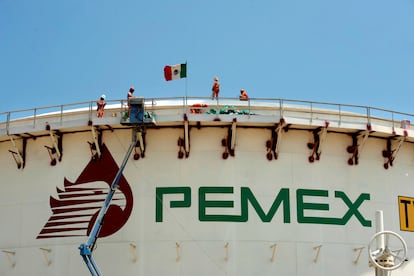Mexico’s energy and climate contradictions are laid bare at COP28
Mexican legislators float an energy transition proposal at the Dubai summit while Pemex gets a boost from the president


Mexico, despite being one of the most populous countries in Latin America and responsible for 23% of the region’s carbon emissions, doesn’t have a pavilion at the Climate Change Summit (COP28) in Dubai. According to Carbon Brief, Mexico’s 137 delegates pale in comparison to the thousands sent by Brazil, and even a small country like Honduras sent two more delegates than Mexico.
Mexico is among the 110+ countries at COP28 that pledged to triple renewable energy capacity by 2030. However, the López Obrador administration seems reluctant to embrace a genuine transition that focuses on renewable energy adoption and moving away from fossil fuels.
“Over the past five years, there hasn’t been any progress in the expansion of renewables. Instead, there has been a strong push to revert back to fossil fuels, disregarding both environmental and economic factors,” said Fernanda Ballesteros, who manages the Natural Resource Governance Institute’s Mexico program.
The Mexican government’s flagship green energy project is Sonora, a huge solar farm that can potentially become the most powerful in Latin America, with a capacity of 1,000 megawatts. However, it is crucial for the country to have a plan to transition away from oil and gas to effectively address climate change, as simply generating renewable electrical energy won’t be enough.
In Mexico, approximately 70% of emissions are caused by fossil fuels. The transportation sector accounts for 40% of these emissions, while the electricity sector contributes 35%. Yet the government’s current focus is on promoting Pemex, the state oil company responsible for 95% of the country’s hydrocarbon production, driven by its goal of achieving energy independence and reducing oil and gas imports.
According to the United Nations Environment Program’s 2023 Production Gap Report, the Mexican government injected approximately $3.5 billion to boost Pemex’s finances. Under the López Obrador administration, the oil company’s tax rate dropped from 65% to 30%. Regarding Mexico’s policies and discourses on a managed and equitable transition away from fossil fuel production, the report starkly concluded: “No such government policies or discourses were identified.”
Ana Tamborrel is the justice and climate policy manager for the Mexico Climate Initiative, where she spearheads the agenda concerning just energy transitions and climate change. “One of Mexico’s proposed reforms,” said Tamborrel, “aims to give electrical transmission priority to plants owned by the state-owned company — the Federal Electricity Commission — most of which use fossil fuels for generation.” Ballesteros noted, “While the [Peña Nieto administration’s] Energy Transition Law set goals for renewable energy expansion, it did not account for the potential output of oil and gas.” Nor has the current government done much to address this, says Ballesteros.
Legislators fill the void left by the Executive Branch
At Colombia’s COP28 pavilion, a group of Latin American legislators urged an accelerated transition away from fossil fuels. Mario Alberto Rodríguez Carrillo, from Mexico’s Citizen Movement party, seized the opportunity to present a report outlining how his country could make the transition. The document he prepared with four other Mexican legislators (including Alberto Villa Villegas from the ruling Morena party) says that if Mexico sticks to its commitments under the Paris Agreement, it could become “a model for an equitable and just energy transition.”
“As the world shifts away from fossil fuels, our focus is on expanding refineries,” said Rodríguez, one of the 32 Mexican congressional representatives who have joined the call for a future without fossil fuels. “The purpose of this report is to show that by securing national and international funding, we can shift towards using fewer fossil fuels and adopting cleaner energy sources.”
In response to significant social pressure, Mexico updated its climate commitments in 2022. The country aims to reduce its emissions by 35% by 2030 without international financing, and could achieve a 40% reduction with support. But legislators and experts alike say “political will is needed” for this to happen.
Over 30 civil society organizations in Mexico have joined forces to produce a six-year (2024-2030) decarbonization and climate resilience plan that will provide guidance to presidential candidates next year. They are making a resounding plea for their message to resonate with the newly elected president in 2024.
Sign up for our weekly newsletter to get more English-language news coverage from EL PAÍS USA Edition
Tu suscripción se está usando en otro dispositivo
¿Quieres añadir otro usuario a tu suscripción?
Si continúas leyendo en este dispositivo, no se podrá leer en el otro.
FlechaTu suscripción se está usando en otro dispositivo y solo puedes acceder a EL PAÍS desde un dispositivo a la vez.
Si quieres compartir tu cuenta, cambia tu suscripción a la modalidad Premium, así podrás añadir otro usuario. Cada uno accederá con su propia cuenta de email, lo que os permitirá personalizar vuestra experiencia en EL PAÍS.
¿Tienes una suscripción de empresa? Accede aquí para contratar más cuentas.
En el caso de no saber quién está usando tu cuenta, te recomendamos cambiar tu contraseña aquí.
Si decides continuar compartiendo tu cuenta, este mensaje se mostrará en tu dispositivo y en el de la otra persona que está usando tu cuenta de forma indefinida, afectando a tu experiencia de lectura. Puedes consultar aquí los términos y condiciones de la suscripción digital.








































